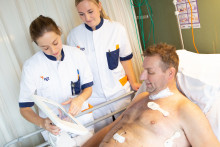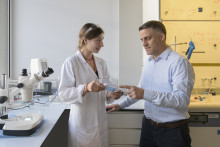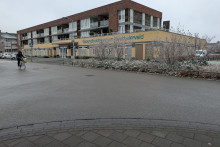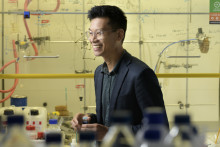‘The study involves patients in the clinical ward who are recovering from a complex surgery,’ explains Mathilde Hermans, the main researcher active in the project. ‘Nurses check the patients’ condition several times a day, but it still happens that their condition gets worse without anyone noticing. A remote monitoring system, such as the one we are testing, might prevent that.’
Pioneers in Healthcare
Mathilde Hermans is a PhD candidate and a lecturer at the chair of Cardiovascular and Respiratory Physiology at the UT. Her work focuses on early recognition of clinical deterioration. In 2017, she received the Pioneers in Healthcare voucher which she used for the study in Almelo, where she started monitoring patients in December.
Sensors
The scientists are using the Isansys platform to test the concept of using a remote monitoring system. The technology includes sensors that are worn on skin and monitor heart rate, respiration rate, temperature, oxygen saturation and activity level. They take patient measurements continuously, sending all the data to a tablet via Bluetooth.
‘The measurements are nothing new, but with this system the patients can move around, not just lie in bed – that is the innovative part,’ highlights Hermans, who goes to the hospital several times a week to take the measurements and test the system. ‘I was surprised at how well the patients accepted the technology. Nurses and doctors are also very interested in it.’

Open questions
Only researchers can currently use the system, though. ‘We monitor patients continuously, but the nurses and doctors don’t yet have access to the system and the data we gather. We first want to see if it is truly helpful for early recognition of complications,’ explains the researcher. ‘There are still many open questions. How can we best interpret all the data we collect? Is the monitoring system feasible, considering the patients move around and the wireless connection isn’t always reliable? Can we develop a smart alarm system that supports the nurses? Because the goal of this project is to support the healthcare professionals, not to replace them.’







